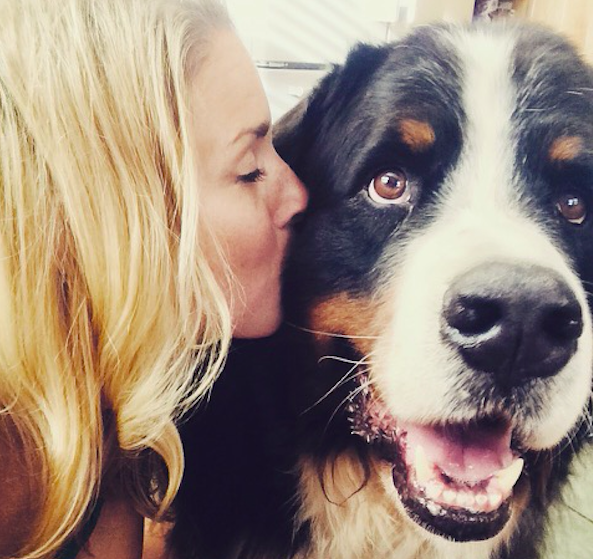I am standing in my kitchen, gazing outside, watching the white flurries fall as Winston is laying down, stuffing his nose in the snow.
His black coat magnifying the sparkle of each snowflake. His white, strong chest that carries a heart so big blends into the fluffy blanket of moisture. He is so happy when it snows; he makes me so happy.
He is my second Bernese mountain dog and is seven. My first one, Bailey, such a kind soul, left this earth much too soon at four. I vowed I’d rather go through another divorce than lose another fur baby. But it is the love they bring into our lives that encourages us to love again—the experience changes us.
This morning was heavy. I found out that my neighbors had to put down their dog of 12 years. Pagoda was part of the family. If I close my eyes, I can hear the pitter-patter of her little paws tapping through the house. Tears are streaming down my face uncontrollably. Why is it so hard to lose a pet? I want to feel it all, almost anticipate it all. Maybe if I grieve just a little bit each day at the thought of losing Winston, maybe then it won’t hurt so bad when it is his time.
Losing a pet changes you. When it first happens, it’s like a dark cloud is following you around. We think we can hear them, the jingle of their collars, their sighs, or pants. Where we walk or drive, we are constantly reminded of them. With time, the pain lessens, and we can begin to acknowledge how it felt to love and care for another creature. Our heart begins to open a bit more knowing that we have the opportunity to give another pet love and comfort.
In losing a pet, we can learn so much about ourselves, each special connection helps us to grow and change and, in time, love again.
Ryan, Pagoda’s dad wrote, “Her energy, nonstop love, and intensity on this earth was concentrated, and never wavering.” There is a different level of respect that we honor our pets with. Having these deep, dedicated relationships and being able to know when it is time to ease their suffering is one of the more unselfish experiences you can go through.
Even at an early age, losing a pet can help us understand our emotions and sort through them. Pagoda’s owner, Indy, at the age of seven, had been processing the loss of his best friend that day. His mom mentioned she could tell that he was teetering between being emotional and logical. After they had an afternoon in the park celebrating Pagoda, they went to lunch. They were greeted by the hostess and Indy stepped forward, confidently made eye contact with the hostess, and said, “We killed my dog today.”
The process of grieving will allow him to feel loss, be emotional, and also have the option to choose communicating in a logical way to begin to move forward.
Pets bring us such joy; they keep us grounded and love with no judgement. They need us as much as we need them, they have the capacity to feel what we feel and empathize, and they do their best to meet us where we are at. Unconditional and uncomplicated love of a pet teaches us to be less judgmental of others and love in a more supported way.
They ask for love when they need it—and wouldn’t that be great to be strong and vulnerable, and to be able to ask for love when we need it?
Losing a pet teaches us to focus on the present moment. Put the screen down, Winston stares at me intently. His huge head comes close as if he is asking for a hug. He nudges his black, white, and tan face, almost touching mine. It tickles as he sniffs, almost like he is giving me butterfly kisses. He is so gentle and polite, never slurping your face with his tongue. Feeling the exchange of love is one of the greatest gifts a pet can provide. It helps us to be open to more possibilities to love and be loved, and to learn how to be here now.
Grieving a pet may not be as prominent as losing an actual family member, but it has been expressed for thousands of years. In ancient times, the Egyptians used to shave their eyebrows as a symbol of grief during the loss of a pet. This seems bold as we all know that eyebrows sometimes don’t grow back, but the expression of showing this in public gives evidence to the gravitas of the loss.
Even dating back to 79 AD, during the eruption of Pompeii, there were families found buried in the ash embracing their dogs. This tells us that loving and losing a pet has been happening throughout ancient times and your feelings are warranted and the grief period is difficult.
If the time does approach, honor yourself as well as them through the process. They want always to be by your side. Do your best to honor that and be at their side when they have their final breaths. It will allow them to peacefully leave this earth and make their way to the Rainbow Bridge.
When we had to put my childhood dog, Yogi, down, my sister and I were away from home and my divorced parents came together despite their own challenges and were there embracing Yogi for his final breaths. Honor them, and tell them they will be okay.
The Rainbow Bridge is the idea that there is a bridge that connects this life with heaven. It’s a meadow filled with streams and butterflies and where animals can run free. It is also a spot for our animals to wait until it is our time and they can then bring us into heaven.
What do you need to do in order to take care of yourself to be able show up for them during their last moments?
Understanding what you need or what resources are available to you that will help you in losing a pet is a proactive approach to self-care and your pets will appreciate it as well, for they see themselves as being the guardian of your life. Seeking out and asking for help and support through your family, friends, and community will really help you feel like you aren’t going through this alone.
Here are a few short tips on how to help ease the grieving process:
>> Have early, open dialogue with your veterinarian and express your wants to ease the process, such as an at-home euthanasia and ceremony. Having the veterinarian come to your home can ease logistics and help everyone remain supported in the comforts of their own home.
>> Find a resource such as the Argus Institute, which provides free support and grief counseling to those making end-of-life arrangements for pets. They will even come to speak on your behalf to your children and explain in terms that they can connect with.
>> Ask for support from family, friends, and your community so you don’t feel alone. You will be surprised by all of the people who are important to you who want to help and are waiting to be asked.
>> Do something every day that brings you joy. No matter how hard it is, strive to do one thing. Your pets lived for joy and they will rest easier knowing you are doing the same.
>> Give yourself permission to grieve and be patient with yourself.
Losing a pet changes us and can also be one of the hardest experiences to process yet there is so much we can learn from our furry companions. We can think of it as a gift—an opportunity to be vulnerable and unapologetically love another creature, while also taking time for reflection.
We can be aware of which relationships should be in our lives and what brings us joy with more intimate connections, purpose, and, above all, gratitude.
~












Read 5 comments and reply